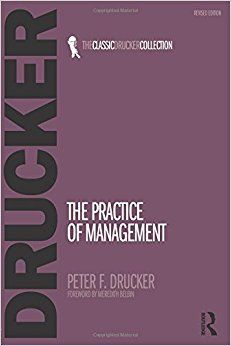By Peter Drucker (1954)
Pages: 340, Final verdict: Great-read
What does it mean to be a manager? Is there such thing as a definition of management? Peter Drucker believed so, and his thoughts on the topic are still among the most influential in the management community. The Practice of Management was a breakthrough book, published in 1954, and exposing for the first time many important concepts such as Management by Objectives.
Peter Drucker was one of the most influential management thinkers of the 20th century. After starting his career in Europe, he moved to the US where he spent the rest of his life, advising hundreds of companies and writing a staggering total of 39 books.
What is Management?
The first surprise in reading The Practice of Management is how its content is still so relevant, more than 60 years after publication. For example, Drucker touches themes such as automation, or corporate social responsibility. Are there other more trendy topics in 2017? Of course, not all topics covered in the book are relevant today, and the topic of automation refers to dated technologies (pre-computers). Still, as usually is the case with great authors, Drucker's words seem to stand the test of time.
The Practice of Management is a guidebook for managers. It first establishes what management is - a multi-purpose organ with the following responsibilities:
- Managing business;
- Managing managers;
- Managing worker and work.
Drucker emphasizes that managing the business is the number one responsibility of management. And managing business means being responsible for concrete business objectives to be attained. It was here, in this book, that Drucker first popularised the concept of Management by Objectives (MBO), which was to become a cornerstone of management theory.
"There is only one valid definition of business purpose: to create a customer." - Peter Drucker
Drucker doesn't evade an important question: if management should manage business, what is the purpose of business?
With great clarity, Drucker shoves away the idea that the goal of a business is the maximization of profit. Instead, he identifies the main purpose of a business as the creation of a customer. As such, Drucker believes a business has only two main functions to fulfil the goal of creating a customer: marketing and innovation.
Concerning the management of managers and management of workers and work, Drucker justifies their importance due to the nature of our society. It is the responsibility of business to provide meaningful work and opportunities to fulfil the aspirations of the members of society.
The purpose of a business is not the maximization of profit; a business is a part of society with the responsibility of providing fulfilment to the aspirations of its workers; managers must manage. - These are clear and straightforward concepts, but how often are they still forgotten in our days?
Making others reach peak performance
"The first requirement of management spirit, then, is a high demand on performance. Managers should not be driven, but they should drive themselves." - Peter Drucker
The Practice of Management is a very complete book, ranging from the purpose of business to organizational structuring, or the management of other workers. With over 300 pages, there is enough discussion of each of these topics, even with interesting (but dated) case studies about Sears, IBM or Ford in the early 20th century. It is on the last part, the management of workers, which I would like to dig deeper.
Drucker also sees managers as teachers, whose role is to ensure the growth and development of the people they work with. But he believes that motivation doesn't come from job satisfaction, it comes from an urge to improve and achieve peak performance.
Another interesting concept which resonated with me was the idea that performance, not "potential", should be used when evaluating who to promote. In other words, when considering a promotion, look for those who effectively showed to be able to achieve objectives, rather than those who promote themselves.
In a concise way, Drucker summarizes the actual components of the work day of a manager in five points:
- Sets objectives;
- Organizes;
- Motivates and communicates;
- Measurement of performance;
- Develops people.
"Who is a manager can be defined only by a man's function and by the contribution he is expected to make. And the function which distinguishes the manager above all is his educational one. The one contribution he is uniquely expected to make is to give others vision and ability to perform. It is vision and moral responsibility that, in the last analysis, define the manager." - Peter Drucker
Lastly, Drucker discusses the responsibility of management as a group in society. Its role being that of aligning the goals of business with what is good for society. Words worth reading again: aligning business with what is good for society. Simple, but powerful.
Bottom line
I am a huge fan of Peter Drucker. This book completely fulfilled my expectations for great foundations on the role of managers and even of business itself.
However, it must also be said that The Practice of Management is not an easy book to read. It took me a couple of months to finish it (with many pauses). I always feel that the reader's life would be much easier if Drucker would use more commas in his sentences. The middle part of the book, on how to organise a company, feels the most dated and less applicable nowadays. I really like what Drucker writes about and I found a lot of guidance in his ideas, but I am not such a big fan of the way he writes.
Another drawback in Drucker's work, which I've noticed in other of his books, is that he provides no evidence in the form of social studies to support his opinions. Although for me, his opinion, and the way he exposes it, is enough.
More than a book about how to be a manager, I felt it was a great book to understand why I should be a (good) manager. If you're considering a career in management, reading Peter Drucker is a must.
Further learning:
- Buy the book online.
- Why read Peter Drucker? (Harvard Business Review)
- The Best of Peter Drucker (Forbes)



